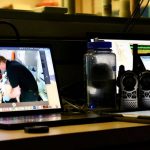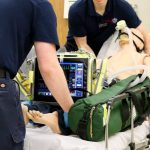The undergraduate studies of the UMBC Department of Emergency and Disaster Health Systems (EDHS) are comprised of one concentration, two tracks, and two minors:
Emergency and Disaster Health Systems Bachelor of Science Degree (B.S.)
- Paramedic Concentration
- Emergency Health Leadership Track
- Emergency and Disaster Health Management Track
Emergency and Disaster Health Systems Minor
Click to find an Undergraduate Advisor
Through this baccalaureate degree, students gain a unique depth of experience in emergency and disaster health systems. The program stresses academic and clinical abilities, interpersonal and leadership skills, and the capacity for appropriate judgment. The major objective of the degree program is to prepare students for work in various occupational settings related to emergency and disaster health systems. The primary emphasis is developing leadership skills and promoting personal and professional growth.
Graduates are prepared to:
- Coordinate and manage emergency and disaster health systems
- Interact effectively with other professionals in the emergency medical services system, as well as with community agencies and the general public
- Satisfy certification requirements for EMT-Basic or EMT-Paramedic
- Conduct or use research
- Pursue graduate study
The Department of Emergency and Disaster Health Systems offers a unique perspective for the education of future EMS professionals. This is accomplished by providing broad liberal arts and sciences education, which enhances the graduates’ employment opportunities as pre-hospital providers and managers. The Department of Emergency and Disaster Health Systems also prepares graduates for advancement to graduate and professional studies.
CAREER AND ACADEMIC PATHS
Federal, state, and local efforts in the past decade have resulted in innovative programs designed to improve the quality and efficiency of emergency health care services. As a result, several career fields have been created. Health professionals are needed at all levels in today’s emergency medical services system. Depending on experience and education, EMS health professionals will serve as emergency medical technicians, educators, supervisors, coordinators, planners, consultants, managers, and directors. Additionally, EMS activities are relevant to ambulance providers, fire and rescue services, hospitals, industrial health services, military, and volunteer EMS organizations.
The solid academic basis of the EDHS baccalaureate degree also prepares students for advanced studies in the sciences, medicine, public health, hospital administration, and other health management programs.
Financial Assistance
We understand that the ability to fund your education is an integral part of the decision-making part for many families below you will find some helpful links to financial assistance options. We highly encourage our students to apply to any and all scholarships they qualify for to reduce the cost of attendance:
UMBC Financial Aid [Click here for more information]
Scholarships available through UMBC [Click here for more information]
Scholarship Assistance for Maryland Residents [Click for more information]
Academic Common Market for Out-of-State Students [Click for more information]
Click here to find out more about UMBC



